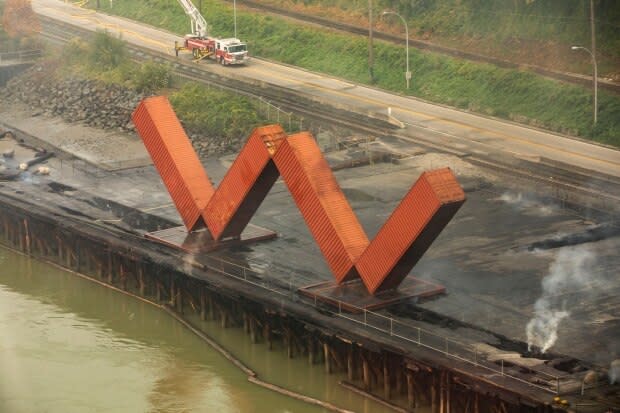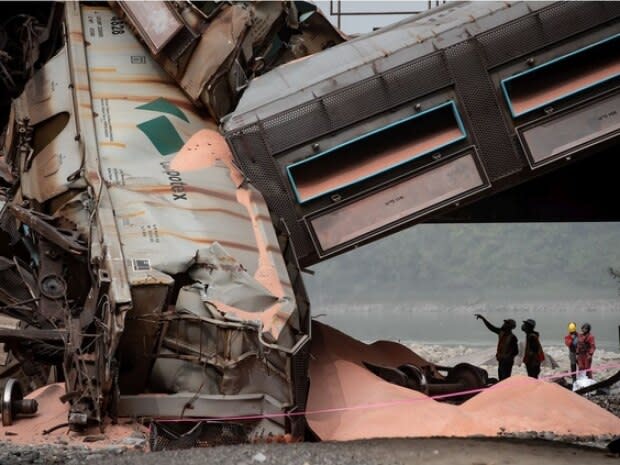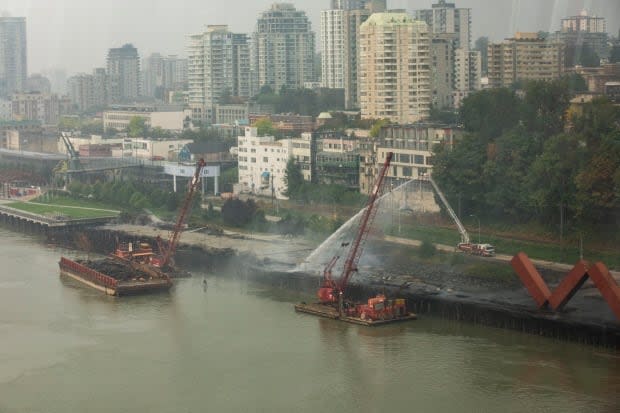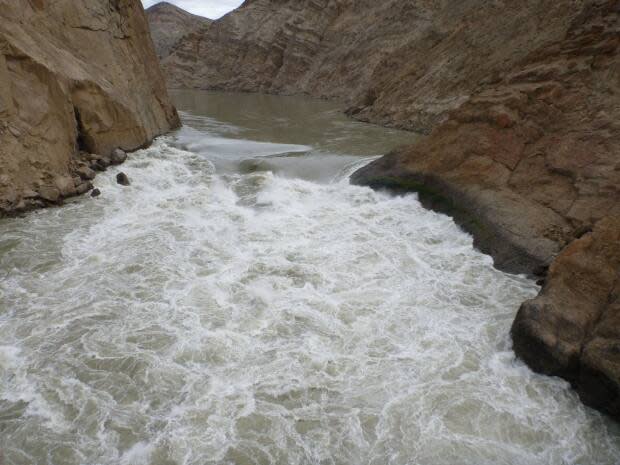Fears rise for Fraser River salmon after Pier Park fire delivers another blow
There are growing concerns about the environmental fallout from a fire Sunday that destroyed New Westminster's Pier Park.
The fire consumed a six-acre section of the pier spewing toxic smoke into the air for days, choking the skies over the riverfront, putting toxins into the river from creosote infused pilings at the foot of the pier at a key time when salmon are returning to the Fraser River to spawn.
When Jason Hwang first saw the smoke, he says, the struggling Fraser River salmon populations were his first thought.

"The Fraser sockeye return is probably the worst return in modern history," said Hwang, a biologist with the Pacific Salmon Federation.
Less than 300,000 salmon are expected this year, less than a third of pre-season forecasts on a run that once generated millions. He said right now in the river — not far from the smouldering pier at certain points — you would expect to find chinook, sockeye, coho, chum and steelhead.
And the pier fire is far from the only hurdle for these fish.
"There have been a number of other problems or challenges or issues that have arisen for salmon lately in the Fraser [River]," said Hwang.
Salmon passage up the river has been choked off in part since the June 2019 Big Bar 2019 rock slide that blocked a narrow spot north of Lillooet.
On Sept. 14, a CN Rail train derailed off a bridge near Hope B.C., some 60 rail cars loaded with potash, spilling some of their load near the river.
By then, the New Westminster fire that began Sunday was under control, but it was still belching heavy toxic smoke, the creosote used to preserve the pilings still providing robust fuel for the flames.
Fireboats and trucks sprayed the pier from land and water, but the fire continued to spew toxic smoke across the Fraser River and send debris into the water.

"Sometimes we look at these things in isolation. It's like well it's not that bad, you know. It's one fire in one small part of the Fraser River, but when you start to add all these things up, it adds up to a fairly difficult story for the salmon," said Hwang.
Elmer Rudolph has won awards for his efforts as a guardian of the Fraser River salmon for decades. The president of the Sapperton Fish and Game Club says he's concerned.
"The creosote is going to be melting. It's on the outside of the logs. It's going to be falling into the water. You can't help but have some kind of contamination in the water there," he said.

Despite this, at least initially, there were no booms or protection to stop the spread of any contamination. The federal dept of Fisheries and Oceans said it was impossible to have containment booms in the water while fireboats were still trying to douse the flames.
DFO said that the Coast Guard has been on site monitoring the situation — and warning those plying the Fraser about the masses of woody debris from the fire drifting downriver — debris that could also be contaminated.
Environment and Climate Change Canada has not yet returned CBC's requests for more information.
Hwang says any chemicals leaching into the Fraser River at this section could affect fish or fish eggs. He says society needs to rethink how developments and industry near watersheds are done, so pollution does not keep hitting salmon populations.
"Frankly, we can do better. I think we are taking some steps in the right direction, but as a society, we really need to recognize that it's our job to be good stewards of these natural resources," he said.



